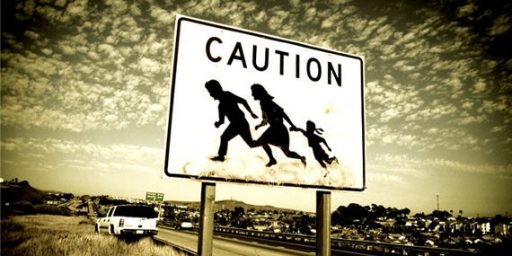Mexicans Leaving USA, Sneaking Back Into Mexico
The American economy is so bad that people are reverse migrating to the Third World.
The American economy is so bad that people are reverse migrating to the Third World.
Pew (“Net Migration from Mexico Falls to Zero—and Perhaps Less“):
The largest wave of immigration in history from a single country to the United States has come to a standstill. After four decades that brought 12 million current immigrants—more than half of whom came illegally—the net migration flow from Mexico to the United States has stopped—and may have reversed, according to a new analysis by the Pew Hispanic Center of multiple government data sets from both countries.
The standstill appears to be the result of many factors, including the weakened U.S. job and housing construction markets, heightened border enforcement, a rise in deportations, the growing dangers associated with illegal border crossings, the long-term decline in Mexico’s birth rates and changing economic conditions in Mexico.
[…]
Among the report’s key findings:
Among the report’s key findings:
- In the five-year period from 2005 to 2010, about 1.4 million Mexicans immigrated to the United States and about 1.4 million Mexican immigrants and their U.S.-born children moved from the United States to Mexico.
- In the five-year period a decade earlier (1995 to 2000), about 3 million Mexicans had immigrated to the U.S. and fewer than 700,000 Mexicans and their U.S. born-children had moved from the U.S. to Mexico.
- This sharp downward trend in net migration has led to the first significant decrease in at least two decades in the number of unauthorized Mexican immigrants living in the U.S.—to 6.1 million in 2011, down from a peak of nearly 7 million in 2007. Over the same period the number of authorized Mexican immigrants rose modestly, from 5.6 million in 2007 to 5.8 million in 2011.
- Mexicans now comprise about 58% of the unauthorized immigrants living in the United States. They also account for 30% of all U.S. immigrants. The next largest country of origin for U.S. immigrants, China, accounts for just 5% of the nation’s stock of nearly 40 million immigrants.
- Apprehensions of Mexicans trying to cross the border illegally have plummeted by more than 70% in recent years, from more than 1 million in 2005 to 286,000 in 2011—a likely indication that fewer unauthorized immigrants are trying to cross. This decline has occurred at a time when funding in the U.S. for border enforcement—including more agents and more fencing—has risen sharply.
- As apprehensions at the border have declined, deportations of unauthorized Mexican immigrants—some of them picked up at work or after being arrested for other criminal violations—have risen to record levels. In 2010, nearly 400,000 unauthorized immigrants—73% of them Mexicans—were deported by U.S. authorities.
- Although most unauthorized Mexican immigrants sent home by U.S. authorities say they plan to try to return, a growing share say they will not try to come back to the U.S. According to a survey by Mexican authorities of repatriated immigrants, 20% of labor migrants in 2010 said they would not return, compared with just 7% in 2005.
- Looking back over the entire span of U.S. history, no country has ever sent as many immigrants to this country as Mexico has in the past four decades. However, when measured not in absolute numbers but as a share of the immigrant population at the time, immigration waves from Germany and Ireland in the late 19th century equaled or exceeded the modern wave from Mexico.
WaPo (“For first time since Depression, more Mexicans leave U.S. than enter“) adds this analysis:
It looks to be the first reversal in the trend since the Depression, and experts say that a declining Mexican birthrate and other factors may make it permanent.
“I think the massive boom in Mexican immigration is over and I don’t think it will ever return to the numbers we saw in the 1990s and 2000s,” said Douglas Massey, a professor of sociology and public affairs at Princeton University and co-director of the Mexican Migration Project, which has been gathering data on the subject for 30 years.
[…]
The trend could have major political consequences, underscoring the delicate dance by the Republican and Democratic parties as they struggle with immigration policies and court the increasingly important Latino vote.
Illegal immigration has emerged as one of the most emotional political issues in the country — one that dominated much of the Republican presidential contest and has proven complicated for President Obama.
Mitt Romney has courted conservatives with aggressive anti-illegal immigration rhetoric. But the GOP presidential hopeful has said in recent days that he wants to build ties with Hispanics, many of whom have chafed at his statements, and the new immigration trends could offer him a chance to soften his stance.
Obama has been criticized by immigrant advocates for stepped-up deportation policies that analysts have said were partly responsible for the decreasing flow of Mexicans into the United States. The trend could offer the president a political silver lining: the chance to take credit for a policy success that, his aides have said in the past, should persuade Republicans to embrace a broad immigration overhaul plan.
In addition to economic factors and the US crackdown on immigration, something else is going on: birth control has made it south of the border.
In 1960, a typical Mexican woman was expected to have more than seven children, but by 2009 that number had dropped to just over two — a decline that presages a sharp reduction in the number of young workers seeking to come to the United States.
One hopes that the lower birthrate continues; it’s a sign of a modernizing economy and ultimately a more prosperous life for the 113-odd million people with whom we share a border. At the same time, of course, it would be awfully nice if the US economy rebounded to it former robust form and became attractive to unskilled immigrants looking to improve their lot in life.
In the meantime, maybe we can come up with a rational immigration policy. I wouldn’t advise holding your breath, however.







We need to secure that dang border. Who’s going to mow my grass?
And, thus, slavery becomes legal again in the US, only now we use prison labor.
@Nikki: Prison labor is not slavery. Indeed, when we abolished slavery with the 13th Amendment, we specifically allowed prison labor:
It’s simply absurd and insulting to equate punishment for crimes with kidnapping innocents and treating them as chattel.
A rational immigration policy? That’s a punchline, right?
….and I’m willing to give Obama credit for reversing the migration.
My apologies to the GOP, it seems that tanking the economy with tax spending, wars, and corporate socialism was simply a means to an end to reverse the trend of illegal immigration … well played.
@James Joyner: I beg to differ. The whole purpose of the new immigration laws was to drive out the illegal immigrant labor so that the for-profit prison systems could then hire out their prison population. It’s already happening in Georgia and Alabama.
The next step is create more stringent laws for minor infractions that will result in more people going to jail and being hired out by the system for their labor.
It’s still slavery.
Between this and the guns that the ATF keeps letting walk across the border, perhaps the Mexicans will consider a border fence
And Mitt hasn’t jumped back on the “self-deportation” idea yet?
@Nikki:
Agreed. Why are non-violent offenders obliged to labor without just compensation? Why even violent offenders?
Pose the question another way: did the framers of the 13th amendment anticipate that private, for-profit corporations should control prisons and compel the labor of prisoners for the benefit of their shareholders? It is an obscenity.
We’ll trade one unskilled humanities graduate for each unskilled laborer. It’s win-win. We get a person who is willing to put in a hard days work and develop useful skills. Mexico gets the cultural influence of a large population of people living the life of the mind. The laborer gets the chance at the American dream. The humanities graduate gets to skip out on their student loans and live among their beloved oppressed peoples. The humanities graduate my have to run the boarder gauntlet since the Obama administration is moving to cancel the passports of those who owe the US government money.
Mostly it’s the stupidity, economy.
Ironically enough the U.S. Chamber of Commerce already has done that for us. Theirs is an excellent plan. It combines increased border control spending with a guest worker program for non-violent illegals, along with much higher maximums for H-1B visas and streamlined processes for green cards and full citizenship for legal immigrants. It’s not completely without fault, but as far as templates go it’s top notch. Alas, there’s simply no way in which it ever will be enacted. A crying shame.
@JKB: That is a classic comment. I’m very jealous that I didn’t write that.
I wonder if anybody has researched the impact of this decline in immigration on the economy. Is it possible that this has lessened demand for housing and goods and services thereby prolonging the recession in places like Arizona? I suspect that the immigrants were a much higher economic impact on our economy than we suspected and more than paid their way.
@Nikki: This is probably a discussion for another day but there is an article this morning from CBS Money Watch on the rise of “debtors prisons” where people are being locked up for failure to pay bills.
And yet, if you listen to the news or conservative commentators you’d think that they were crossing the border INTO America by the thousands every day.
@Scott: Bingo. That is _exactly_ the “next step” Nikki was talking about.
@Scott: Here’s the link to the Money Watch article. This is what I believe will be driving the rise in prison labor:
All I have to say is “Yeayyyyyyyy”
My first concern is that Mexico might applying to its northern border the same level of security it applies to its southern border. Crossing into Mexico illegally can get you killed down there…
Great. Obama’s found a way to stop illegal immigration — he’s destroying the economy, to get rid of the incentive to come here illegally. Definitely a case of the disease being worse than the cure.
On the plus side, this should greatly increase the ratio of legal immigrants to illegal ones…
@Xenos: “did the framers of the 13th amendment anticipate that private, for-profit corporations should control prisons and compel the labor of prisoners for the benefit of their shareholders?”
I don’t think they would have cared. For one thing, the abolitionists tended to promote a form of rehabilitative prison reform requiring work, both for improving morality and self-governance. Work was for the benefit of the convict.
Secondly, the 13th was intended to allow freed slaves to return to their former plantations to work as apprentices for a term, with the idea that they would be taught useful skills and transition to economic independence. That is, non-convicts were being channelled by the Freedmen’s Bureau into work at the abandoned plantations, at least partially for the benefit of former slave owners. The 14th was partly in repsonse to the abuses that arose.
@Jenos Idanian:
The collapse and crash of the financial and housing markets in 2008 caused the vaporization of trillions of dollars in wealth and income, and demand from the economy. Subsequently, Obama took necessary actions to prevent the economy from plunging into another Great Depression – that is not destroying the economy.
When you got nothing, just make shit up eh? Not that any passport policy likely affects you.
@Davebo: http://www.theatlantic.com/business/archive/2012/04/no-taxes-no-travel-why-the-irs-wants-the-right-to-seize-your-passport/255940/
http://www.infowars.com/irs-to-revoke-passports-of-30000-u-s-troops/
Doesn’t sound so made up, at least not if you owe taxes.
Amazing how short some people’s memories are. As if the economy was going gangbusters in January, 2009 and isn’t better now than it was then….
That’s exactly what happened. Don’t you watch Fox?
Oh, BTW Dr. Joyner. Since you were commenting on “all the good” Chuck Coulson’s prison mintries have done, you might want to check out the other side of that coin:
http://motherjones.com/politics/2012/04/angola-prison-3-herman-wallace-albert-woodfox-40-years-solitary-confinement